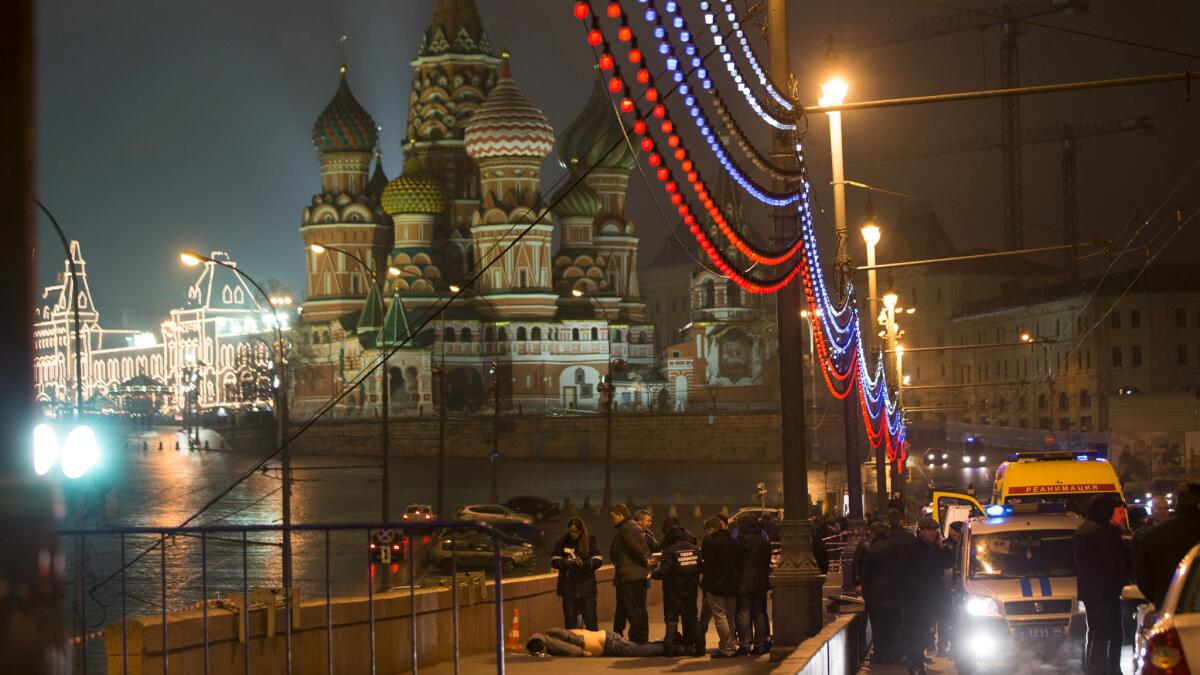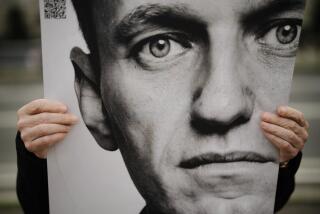Trial begins in slaying of Russian opposition leader Boris Nemtsov

- Share via
Reporting from Moscow — Five men accused of organizing and carrying out the brazen, contract-style killing of opposition leader Boris Nemtsov stood trial in a Moscow military court on Monday.
Nemtsov, a charismatic and athletic former deputy prime minister who became a fierce government critic, was killed in February 2015 on a bridge just yards away from the vermillion walls of the Kremlin.
Widely seen as a successor to ailing President Boris Yeltsin in the late 1990s, Nemtsov was one of the leaders of Russia’s fractured and politically marginalized liberal democrats. He fearlessly lambasted President Vladimir Putin and his ally Ramzan Kadyrov, a Kremlin-backed leader of Chechnya, whom he accused of pocketing lavish government funds, extrajudicial killings, kidnappings and torture.
The slaying suspect, a decorated officer named Zaur Dadayev, and his four alleged accomplices are all ethnic Chechens. Dadayev, who fought against separatists in the second Chechen war and whom Kadyrov called “a fearless warrior” and a “true patriot of Russia,” was arrested shortly after the slaying.
Kadyrov claimed the defendants were not guilty and alleged that “one has to look for the traces of the crime not in Chechnya, but in Ukraine and then further, in the USA,” according to his statement posted on Instagram in June 2015. He claimed that the slaying was organized by a former Chechen separatist who fought against pro-Russian forces in eastern Ukraine.
Defendant Dadayev told investigators in March 2015 that he had shot Nemtsov for “anti-Islamic statements,” but later retracted his confession, claiming he was kidnapped and tortured. All the defendants pleaded not guilty.
They face at least eight years in jail on the murder and illegal arms possession charges. One more suspected accomplice was killed in Chechnya while being detained, and one more suspected organizer is still at large.
That suspect, another decorated Chechen officer named Ruslan Mukhudinov, along with “other unidentified persons,” allegedly hired the defendants in September 2014 and paid them “at least 15 million rubles” ($240,000), investigators said.
The defendants purchased two cars, burner phones and a pistol, and followed Nemtsov for several months, mapping his routes and tracking his comments in media reports and social networking pages, investigators said.
On Feb. 28, 2015, the defendants spent 10 hours in a car parked outside Nemtsov’s apartment in central Moscow. They drove after him to a café near the Kremlin, where Nemtsov and his companion, a Ukrainian model, had dinner. As the two walked to cross the Moskva river, Dadayev shot Nemtsov in the back six times, killing the 55-year-old politician on the spot, investigators said.
Nemtsov’s family lawyers have long maintained that authorities have failed to provide video from dozens of surveillance cameras around the Kremlin, while investigators refused to question Kadyrov and his allies as witnesses.
“The case is not solved before the real organizers and motives are identified,” attorney Vadim Prokhorov said in an interview.
Nemtsov’s slaying sent shockwaves across Russia and drew condemnations from around the world. The spot where he was killed is still covered with bouquets of flowers and photographs of Nemtsov, despite regular cleanups ordered by authorities.
Since the mid-2000s, pro-Kremlin groups staged pranks against Putin’s critics and opposition. Nemtsov, who led opposition parties and organized anti-Putin rallies, was their favorite target – they doused him with smelly liquids, and pelted him with eggs and cakes. Video of those attacks was often aired on Kremlin-controlled television networks as part of “analytical” shows that accused Nemtsov and other opposition figures of allegedly receiving funding from Western governments and plotting a coup.
Nemtsov wrote several lengthy reports detailing Putin’s alleged secret wealth, widespread corruption among top Kremlin officials, and purported wrongdoings of Gazprom, Russia’s state-run natural gas giant.
He also was critical of Moscow’s 2014 takeover of Crimea and support of pro-Russia separatists in eastern Ukraine. He had started working on a report on the Kremlin’s role in the war shortly before his death.
Mirovalev is a special correspondent.
More to Read
Sign up for Essential California
The most important California stories and recommendations in your inbox every morning.
You may occasionally receive promotional content from the Los Angeles Times.










